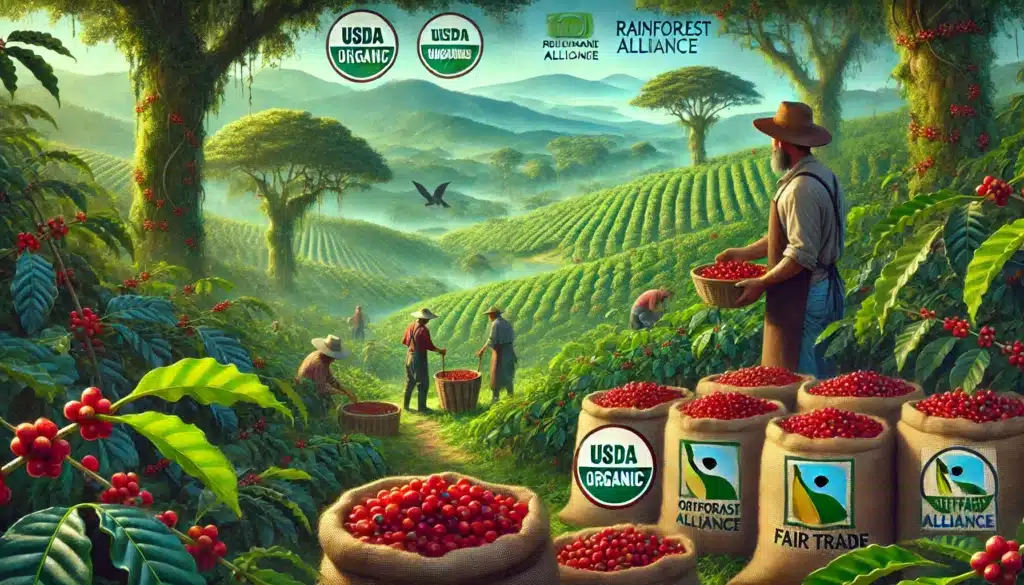As coffee lovers become more environmentally and socially conscious, terms like organic, shade-grown, and sustainably sourced are appearing more often on coffee labels. But what do they really mean — and which ones are worth your investment?
In this article, we break down what makes a coffee sustainable, explore key certifications, and help you choose options that align with your values and your palate.
1. What Is Organic Coffee?
Organic coffee is grown without synthetic fertilizers, pesticides, or herbicides.
To be certified organic, farms must follow strict guidelines that:
- Preserve soil health
- Protect biodiversity
- Avoid harmful chemicals
These practices are better for farmers, ecosystems, and consumers — but organic certification alone doesn’t guarantee superior taste.
2. The Value of Shade-Grown Coffee
Shade-grown coffee is cultivated under a canopy of native trees, mimicking natural ecosystems.
Benefits include:
- Habitat protection for birds and wildlife
- Improved soil moisture and pest control
- Reduced need for synthetic inputs
It often results in slower ripening beans, which can improve flavor complexity.
3. What Does “Sustainable” Really Mean?
Sustainability in coffee goes beyond farming methods. It includes:
- Environmental impact (soil, water, biodiversity)
- Social equity (fair wages, safe working conditions)
- Economic stability for producers
Truly sustainable coffee addresses long-term viability across the supply chain.
4. Key Certifications and What They Mean
Several certifications help identify sustainable coffee:
- USDA Organic: No synthetic chemicals
- Fair Trade: Fair prices and labor protections
- Rainforest Alliance: Environmental and social responsibility
- Bird Friendly®: Rigorous shade and biodiversity criteria
Each has its focus — combining certifications often reflects stronger sustainability.
5. Direct Trade and Transparency
Some roasters skip third-party certification in favor of direct trade relationships.
These coffees often:
- Come with full transparency on origin and farm practices
- Support long-term partnerships with growers
- Provide above-market payments to producers
Look for roasters that share farm names, photos, and detailed sourcing info.
6. Does Sustainable Coffee Taste Better?
Often, yes — because sustainable practices lead to healthier soil, better beans, and more attention to detail.
Organic and shade-grown coffees:
- Tend to have cleaner, more distinct flavor profiles
- Often come from small-batch, quality-driven producers
However, taste also depends on roasting, freshness, and brewing.
7. The Cost of Ethical Coffee
Sustainable coffee usually costs more — and for good reason.
You’re paying for:
- Better wages for farmers
- Eco-friendly practices
- Higher-quality post-harvest processing
Think of it as an investment in quality and ethics, not just a product.
8. Supporting Local and Responsible Roasters
Many small-batch roasters specialize in:
- Sourcing ethically and transparently
- Educating consumers about sustainability
- Prioritizing relationship-based trade over mass distribution
Buying from these roasters is a great way to support the movement.
9. Watch Out for Greenwashing
Not all “eco-friendly” coffee is truly sustainable.
Avoid vague claims like:
- “Natural” or “eco coffee” with no verification
- Generic green packaging without certifications
- Brands that don’t disclose sourcing details
Always check labels, ask questions, and do a little research.
10. Making Informed Choices
To find coffees worth your money and values:
- Look for certifications that matter to you
- Choose direct trade when possible
- Prioritize flavor, freshness, and traceability
Even small changes — like switching to a sustainable brand or trying organic beans once a week — make a difference.
Final Thoughts: A Better Brew for You and the Planet
Sustainable and organic coffees offer more than just peace of mind — they often bring better flavor, richer stories, and lasting impact to your daily ritual.
With every cup, you can support ecosystems, empower farmers, and enjoy something truly meaningful.







